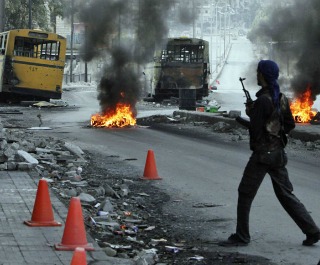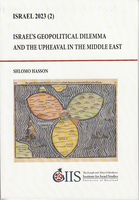Alpher discusses what he thinks Secretary of State Kerry's peace plan might look like, whether either side, the Netanyahu government or the PLO, cold present a unified negotiating position, a possible "laundry list" of confidence building measures (CBMs) and gestures reportedly discussed or initiated by Kerry, whether Hezbollah's openly joining the fighting in Syria on the side of the Assad regime is a turning point, and if the Netanyahu government is making any significant progress on "burden sharing", meaning conscription of Haredi (ultra-orthodox) youth.
Blog: May 2013 Archives
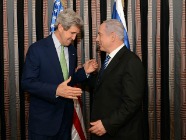
Recently, the news broke that Secretary of State John Kerry personally called Israeli Ambassador Michael Oren to protest the Israeli government's decision to "legalize" four illegal outposts - a decision that, if implemented, will mean the establishment of four new settlements. Secretary Kerry reportedly also asked the Israeli government to delay the move or rethink its decision.
Israel's Peace Now movement (Shalom Achshav) is leading a vociferous campaign against the Israeli government's intention to establish four new settlements in the West Bank.
The government informed Israel's Supreme Court last week that it intends to legalize four settlement "outposts" that settlers built illegally, and which the Government of Israel has previously committed to remove. Benjamin Netanyahu's government did so in a formal response to a petition that Peace Now has filed to Israel's Supreme Court in 2007 against the creation of six illegal outposts.
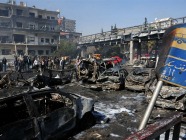
Alpher discusses Syria's civil war and Israel's possible involvement, the best Syrian end-game from Israel's standpoint, whether, as long as Assad holds onto power, can the Syria-Israel border remain quiet, whether there are any signs of progress in Kerry's effort to renew final status negotiations,

On Friday, May 17, Americans for Peace Now co-sponsored an event on Capitol Hill to discuss the Arab League's Peace Initiative (API) and its potential as a tool to advance Israeli-Palestinian peace efforts.
This is the eighth in a series of reviews of new books on Middle Eastern affairs. We asked Dr. Gail Weigl, an APN volunteer and a professor of art history, to review Shlomo Hasson's new book on Israel's geopolitical dilemma in a changing Middle East.
Shlomo Hasson, Israel's Geopolitical Dilemma and the Upheavals in the Middle East, translated by Mairav Zonszein (College Park: University of Maryland Institute for Israeli Studies, 2013). 92 pages.
This slim, densely written book is recommended to anyone interested in Israel's future as a democratic state. It is particularly relevant to those who seek to understand that future in the context of regional and global social, political, economic and cultural developments. It is the work of an analyst steeped in knowledge of the geopolitical circumstances confronting Israel, her allies and enemies, with the added advantage of presenting a lucid and canny synopsis of how those circumstances are impacted by conditions as diverse as the changing face of the Arab world, and the challenges facing the United States as a global power.
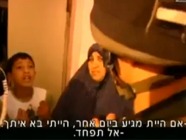
By Ori Nir
Israel TV Channel 2 recently ran a lengthy report of pre-dawn arrests of Palestinian children -- rock-throwing suspects -- at a West Bank Palestinian refugee camp. The TV crew was embedded with an Israeli unit that raided the camp.
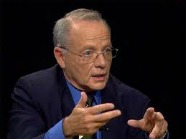
Briefing call with Israeli political analyst Akiva Eldar on the Netanyahu government's reaction to the Obama administration's effort to revive the Israeli-Palestinian peace process .

The holiday of Shavuot, which begins this Tuesday night and continues through Thursday, celebrates the giving of the Torah at Mount Sinai.
There are many traditions associated with Shavuot, including staying up throughout the night to study. Among the most beloved of the traditions associated with Shavuot is the eating of dairy meals (and cheesecake for we Americans!). This tradition is sometimes explained as being derived from the fact that the gift of Torah and its teachings are a guide towards justice and compassion. Killing, even killing for meat, which is permitted under some circumstances, is incompatible with these ways of compassion.

Enjoy your cheesecake!.

by Lara Friedman, Daniel Seidemann
At the crux of the ongoing controversy over Google's decision to recognize "Palestine" on its google.ps landing page is an emphatic refusal by some in Israel (and abroad) to accept empirical reality. That reality is pretty uncomplicated. Most of the world today recognizes the Palestinians as a people. Most countries have voted at the U.N. to recognize Palestine as a theoretical state that must one day come into being in areas currently controlled by Israel. No nation on earth endorses Israel's continued occupation of the West Bank and East Jerusalem; Israeli actions to further entrench the occupation continue to provoke global condemnation.

by Lara Friedman
People keep asking me: "Have you seen the news? Has Bibi actually frozen settlements? What does this mean?"

Israel observes Yom Yerushalayim (Jerusalem Day) today. The holiday commemorates the reunification of Jerusalem and the establishment of Israeli control over the Old City in June 1967. The maps below show where Israel expanded the boundaries of Jerusalem after 1967. The "Indivisible city" actually includes a large amount of territory which was never a part of Jerusalem. 23 Palestinian villages were annexed to Jerusalem. East Jerusalem Palestinians were given permanent residency in Israel, but not full citizenship.
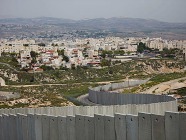 According to an Israeli radio report earlier today, Israel's Prime Minister Benjamin Netanyahu recently ordered Minister of Housing Uri Ariel not to issue new tenders for construction in settlements.
According to an Israeli radio report earlier today, Israel's Prime Minister Benjamin Netanyahu recently ordered Minister of Housing Uri Ariel not to issue new tenders for construction in settlements.
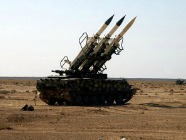
Alpher discusses the Israel Air Force attacks on shipments of Iranian missiles near Damascus, the significance of Qatari PM Hamad bin Jassim having declared that the Arab Peace Initiative could involve "comparable and mutual agreed minor swaps of land" along the 1967 lines between Israel and Palestine, and Google's announcement that it had decided to include "Palestine" in its list of options for national pages.
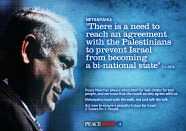
Israel's Prime Minister Benjamin Netanyahu this week reportedly said that an agreement with the Palestinians must be reached "that will prevent Israel from becoming a bi-national state, but will provide stability and security."
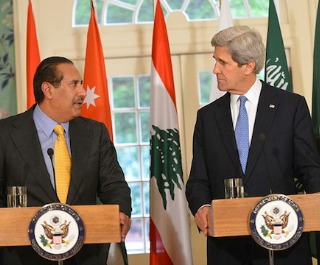
Washington, DC - Americans for Peace Now (APN) warmly welcomes the Arab League's decision to soften its peace initiative to accommodate future land-swaps between Israel and the Palestinians, as a part of an Israeli-Palestinian peace agreement. APN is gratified to see that this positive development does not go unnoticed by Israel's leaders.

by Rabbi Mark Asher Goodman
If you follow God's commandments, you will have peace (shalom) in the land of Israel. And you will dwell in security (la'vetach). And you when you chase your enemies, they will fall by your sword. What kind of 'peace' and 'security' is it if violence is still seemingly ensured?
Blog Monthly Archives
- January 2014
- December 2013
- November 2013
- October 2013
- September 2013
- August 2013
- July 2013
- June 2013
- May 2013
- April 2013
- March 2013
- February 2013
- January 2013
- December 2012
- November 2012
- October 2012
- September 2012
- August 2012
- July 2012
- June 2012
- May 2012
- April 2012
- March 2012
- February 2012
- January 2012
- December 2011
- November 2011
- October 2011
- September 2011
- August 2011
- July 2011
- June 2011
- May 2011
- April 2011
- March 2011
- February 2011
- January 2011
- December 2010
- November 2010
- October 2010
- September 2010
- August 2010
- July 2010
- June 2010
- May 2010
- April 2010
- March 2010
- February 2010
- January 2010
- December 2009
- November 2009
- October 2009
- September 2009
- August 2009
- July 2009
- June 2009
- May 2009
- April 2009
- March 2009
- February 2009
- January 2009
- December 2008
- November 2008
- October 2008
- September 2008
- August 2008
- July 2008
- June 2008
- May 2008
- April 2008
- March 2008
- February 2008
- January 2008
